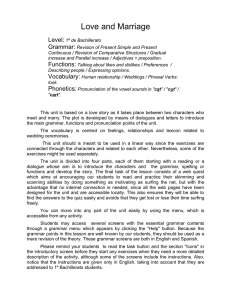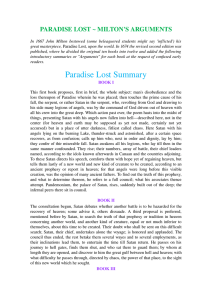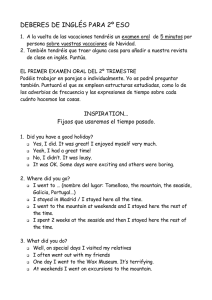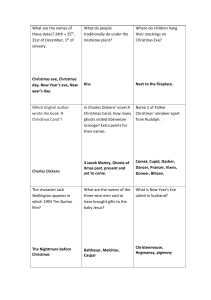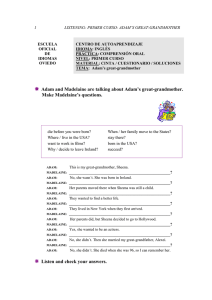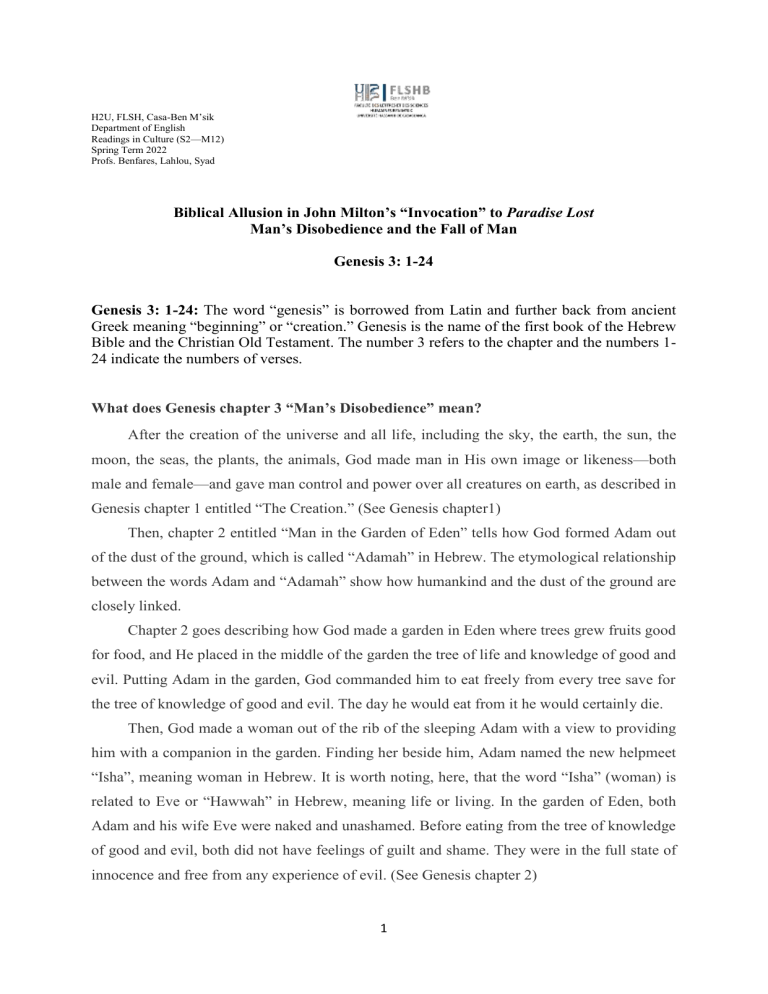
H2U, FLSH, Casa-Ben M’sik Department of English Readings in Culture (S2—M12) Spring Term 2022 Profs. Benfares, Lahlou, Syad Biblical Allusion in John Milton’s “Invocation” to Paradise Lost Man’s Disobedience and the Fall of Man Genesis 3: 1-24 Genesis 3: 1-24: The word “genesis” is borrowed from Latin and further back from ancient Greek meaning “beginning” or “creation.” Genesis is the name of the first book of the Hebrew Bible and the Christian Old Testament. The number 3 refers to the chapter and the numbers 124 indicate the numbers of verses. What does Genesis chapter 3 “Man’s Disobedience” mean? After the creation of the universe and all life, including the sky, the earth, the sun, the moon, the seas, the plants, the animals, God made man in His own image or likeness—both male and female—and gave man control and power over all creatures on earth, as described in Genesis chapter 1 entitled “The Creation.” (See Genesis chapter1) Then, chapter 2 entitled “Man in the Garden of Eden” tells how God formed Adam out of the dust of the ground, which is called “Adamah” in Hebrew. The etymological relationship between the words Adam and “Adamah” show how humankind and the dust of the ground are closely linked. Chapter 2 goes describing how God made a garden in Eden where trees grew fruits good for food, and He placed in the middle of the garden the tree of life and knowledge of good and evil. Putting Adam in the garden, God commanded him to eat freely from every tree save for the tree of knowledge of good and evil. The day he would eat from it he would certainly die. Then, God made a woman out of the rib of the sleeping Adam with a view to providing him with a companion in the garden. Finding her beside him, Adam named the new helpmeet “Isha”, meaning woman in Hebrew. It is worth noting, here, that the word “Isha” (woman) is related to Eve or “Hawwah” in Hebrew, meaning life or living. In the garden of Eden, both Adam and his wife Eve were naked and unashamed. Before eating from the tree of knowledge of good and evil, both did not have feelings of guilt and shame. They were in the full state of innocence and free from any experience of evil. (See Genesis chapter 2) 1 Chapter 3 of Genesis tells the story of the fall of man. The chapter portrays the ways of Satan in tempting humankind and introduces for the first time the idea of sin into the human race and the severity of the consequences of man’s disobedience. The chapter Both Adam and Eve transgressed the command of God by eating from the tree of knowledge of good and evil. The eating of the food of the tree of knowledge is of course symbolic. The act of eating is symbolic of mankind’s transgression of God’s commandment. Eating of the tree brought awareness of Adam and Eve’s capacity for sin, which led to their separation from God who created them. In the third chapter of Genesis we are told that Satan promised Eve that she would become as God, knowing good from evil, if she ate the fruit from the forbidden tree. In his conversation with Eve, Satan seemed to tell the truth but, in fact, he is not. He explained away the order of God not to eat of the tree as God’s wish not to make Adam and Eve open their eyes to truth about good and evil. Satan cast doubt on God’s order. According to the serpent, God was concealing something from Eve that eating from the tree would provide her. It is also likely that Eve was tempted by the desire for wisdom apart from the wisdom God had already given her. And so she did eat the forbidden fruit that she gave of to her husband Adam as well. The reason for eating the forbidden fruit is that Eve and Adam thought they would become knowledgeable about both good and evil. However, eating the forbidden fruit, both Adam and Eve had their eyes open and became aware of their nakedness. In other words, before eating the fruit their nakedness was not a source of shame, but now it became so. This It is worth explaining that God forbade Adam and Eve to eat of the tree of knowledge of good and evil because both Adam and Eve, as humans, could not be able to know evil without participating in it. God has the full capacity to know evil without being or part of it. Unlike humankind, God’s knowledge of evil is not experiential. Adam and Eve’s sudden self-consciousness about their nudity shows that their newly acquired knowledge is achieved by the rejection of good—God’s commandment—and the embracing of evil—following Satan. In a word, Adam and Eve lost their Edenic innocence. Note also that the fact of staying alive after eating the forbidden fruit does not contradict God’s warning, for the decree of death is not physical death, but spiritual death. Eating of the tree of knowledge of good and evil, Adam and Eve got separated from God. The separation was not caused by God; rather, it is Eve and Adam who initiated such separation. Trespassing the command of God, Adam and Eve felt guilt and shame. They helplessly attempted to hide from God. When asked why they violated the order of God, both Adam and Eve shifted the responsibility. Adam answered that it was Eve who offered him the fruit, and 2 Eve said it was the serpent who deceived her into eating the fruit. Fully ashamed to assume their guilt, Adam and Eve threw the blame on someone else apart from themselves. God passed judgment on Satan and humanity. Perpetual war between Satan and mankind would characterise human existence. The offspring (the seed) of Adam and Eve would fight Satan and his children. God predicted that even though Satan would inflict pain on Christ, the latter would destroy him at the end. In Christianity, Jesus Christ was put to death by the Romans through crucifixion, yet three days later God raised him from the dead and ascended him into Heaven to be descended again at the end of times so as to ultimately destroy the Antichrist. The seed of Eve is Jesus Christ and the seed of Satan is the Antichrist. The punishment of Eve and Adam has far-reaching consequences because it still affects humanity nowadays. While Eve would suffer extreme pain in bearing and giving birth to children, Adam would toil the cursed ground to survive till death. Despite Adam and Eve’s disobedience and sin, God offered skin coats and clothed them, showing the protective care of God. It looks God allowed them to use animal skins (hides) to protect them from extreme weather, for they were going to be banished from the garden of Eden. And once Adam and Eve were expelled from Eden, God appointed an angel (cherubim) to guard the tree of life. God, in fact, did not keep Adam and Eve in the garden of Eden for fear they would eat of the tree of life and would become, therefore, immortal and live forever with their fallen souls. 3

